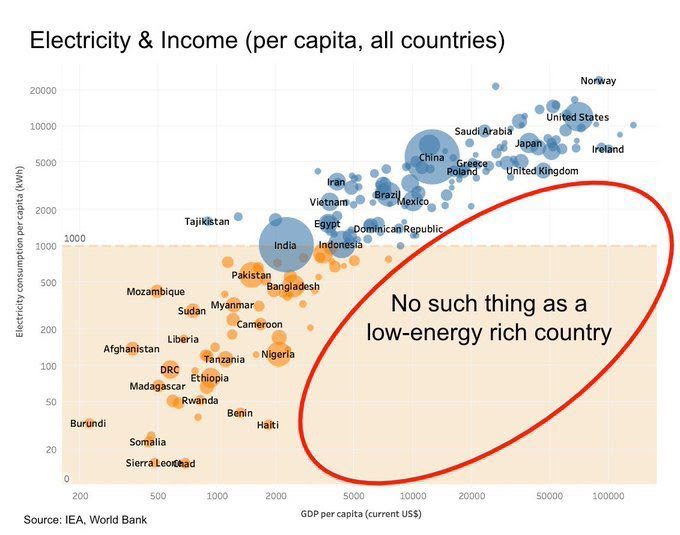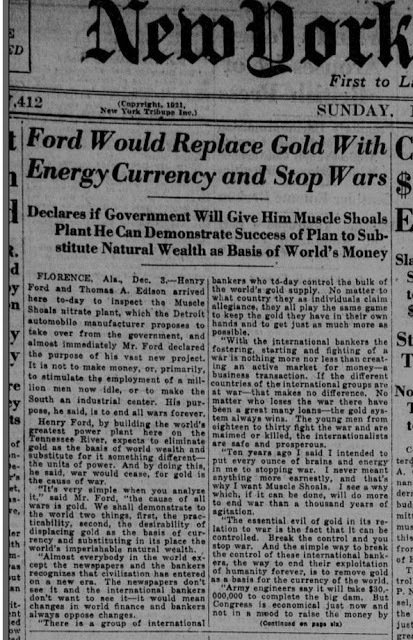-

@ Woody
2025-01-26 22:10:39


**Law of Conservation of Energy:**
The Law of Conservation of Energy states that energy cannot be created or destroyed, only converted from one form to another. This means that the total energy of an isolated system remains constant over time, but the form of energy can change (e.g., from kinetic energy to potential energy). This fundamental principle in physics highlights the importance of energy efficiency and the potential for energy to be transformed and reused.
**Henry Ford's Energy Currency:**
Henry Ford, the founder of the Ford Motor Company, proposed the concept of an "energy currency" in the 1920s. He suggested that energy, rather than gold or other commodities, could serve as the basis for a new monetary system. Ford's idea was that energy is the fundamental unit of value, as it is the driving force behind all economic activity. He proposed that energy could be used as a standard unit of exchange, allowing for more efficient and equitable trade.
**Buckminster Fuller's View on Energy Production and Wealth:**
Buckminster Fuller, a renowned architect, systems theorist, and futurist, believed that energy production is the key to creating wealth and abundance. He argued that energy is the fundamental driver of economic growth and that increasing energy production can lead to increased prosperity. Fuller's concept of "ephemeralization" suggests that as energy production becomes more efficient and widespread, the cost of goods and services decreases, leading to increased abundance and wealth. He also emphasized the importance of designing systems that maximize energy efficiency and minimize waste, allowing for more equitable distribution of resources and wealth.
[](https://v.nostr.build/O1F9io3FgKbhuagy.mp4)
[](https://v.nostr.build/F6WhrU5RO4tGaNBa.mp4)
 @ Woody
2025-01-26 22:10:39  **Law of Conservation of Energy:** The Law of Conservation of Energy states that energy cannot be created or destroyed, only converted from one form to another. This means that the total energy of an isolated system remains constant over time, but the form of energy can change (e.g., from kinetic energy to potential energy). This fundamental principle in physics highlights the importance of energy efficiency and the potential for energy to be transformed and reused. **Henry Ford's Energy Currency:** Henry Ford, the founder of the Ford Motor Company, proposed the concept of an "energy currency" in the 1920s. He suggested that energy, rather than gold or other commodities, could serve as the basis for a new monetary system. Ford's idea was that energy is the fundamental unit of value, as it is the driving force behind all economic activity. He proposed that energy could be used as a standard unit of exchange, allowing for more efficient and equitable trade. **Buckminster Fuller's View on Energy Production and Wealth:** Buckminster Fuller, a renowned architect, systems theorist, and futurist, believed that energy production is the key to creating wealth and abundance. He argued that energy is the fundamental driver of economic growth and that increasing energy production can lead to increased prosperity. Fuller's concept of "ephemeralization" suggests that as energy production becomes more efficient and widespread, the cost of goods and services decreases, leading to increased abundance and wealth. He also emphasized the importance of designing systems that maximize energy efficiency and minimize waste, allowing for more equitable distribution of resources and wealth. [](https://v.nostr.build/O1F9io3FgKbhuagy.mp4) [](https://v.nostr.build/F6WhrU5RO4tGaNBa.mp4)
@ Woody
2025-01-26 22:10:39  **Law of Conservation of Energy:** The Law of Conservation of Energy states that energy cannot be created or destroyed, only converted from one form to another. This means that the total energy of an isolated system remains constant over time, but the form of energy can change (e.g., from kinetic energy to potential energy). This fundamental principle in physics highlights the importance of energy efficiency and the potential for energy to be transformed and reused. **Henry Ford's Energy Currency:** Henry Ford, the founder of the Ford Motor Company, proposed the concept of an "energy currency" in the 1920s. He suggested that energy, rather than gold or other commodities, could serve as the basis for a new monetary system. Ford's idea was that energy is the fundamental unit of value, as it is the driving force behind all economic activity. He proposed that energy could be used as a standard unit of exchange, allowing for more efficient and equitable trade. **Buckminster Fuller's View on Energy Production and Wealth:** Buckminster Fuller, a renowned architect, systems theorist, and futurist, believed that energy production is the key to creating wealth and abundance. He argued that energy is the fundamental driver of economic growth and that increasing energy production can lead to increased prosperity. Fuller's concept of "ephemeralization" suggests that as energy production becomes more efficient and widespread, the cost of goods and services decreases, leading to increased abundance and wealth. He also emphasized the importance of designing systems that maximize energy efficiency and minimize waste, allowing for more equitable distribution of resources and wealth. [](https://v.nostr.build/O1F9io3FgKbhuagy.mp4) [](https://v.nostr.build/F6WhrU5RO4tGaNBa.mp4)